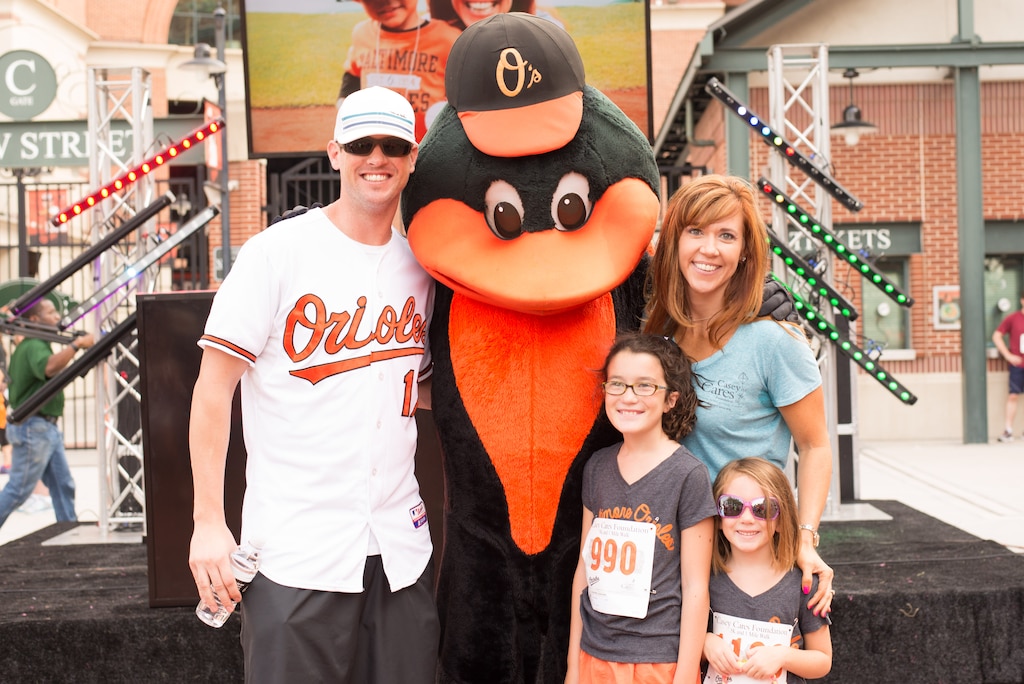Brian Matusz knew his role.
Against the Red Sox, he had one man to get out: Hall of Famer David Ortiz. And he did just that. “Big Papi” got only four hits off Matusz in 29 at-bats and struck out 13 times. Against the Yankees, Matusz was sent out to face their left-handed-heavy lineup, including Robinson Canó and Curtis Granderson.
It was a challenge, but Matusz took it in stride to help the Orioles usher in a new era, one when they would make the playoffs in 2012 for the first time in over a decade and follow with a second appearance and American League East title in 2014.
“We were kind of getting bullied by the Red Sox and the Yankees,” former Orioles manager Buck Showalter said. “Brian helped us negate that. Especially after the sixth inning, we always could keep those left-handed bats in check, and Brian was a big part of that.”
Now his teammates, friends and former manager look back on those days with fondness, remembering Matusz, who was found dead Monday after police in Phoenix responded to a call about a body at a home. The manner and cause of death are not known, and the incident is being handled as a death investigation, police said.
Police have not said whether they suspect foul play.
As word spread Tuesday night and into Wednesday, news hit the baseball community hard. Matusz struggled finding his identity after his playing days — as many players do — but he was hoping to get involved in the game again.
“It’s just sad,” said Showalter, who heard from many of Matusz’s teammates. “I hope he gets some peace. He’s had a lot of challenges in the last few years trying to come to grips with being out of baseball.”
More than his on-field moments, those who knew him remember the friendships they had with him. Matusz was part of what Showalter considers one of the closest clubhouses he’s ever seen, which contributed greatly to the team’s success.
They think of the way Matusz loved to walk out to the bullpen at the start of the game with the relievers who would be used in earlier innings, even though he could have waited until the sixth inning, closer to when he might appear and need to start warming up, to head there. He liked being a part of the group and wanted to be there for his teammates.
And they recall his connections with the community. Matusz was never too busy to say hi to a fan or attend a community event. He even remained on the board of a local charity, the Casey Cares Foundation, long after his playing days were over.

“Brian was a great friend,” former teammate and close friend Zack Britton said in a tweet. “Too hard to express everything at this time, but remember him for the passion he had for the game of baseball and in using his platform to support children through Casey Cares.”
A first-round pick in 2008 out of the University of San Diego, Matusz made his MLB debut as a starter in 2009 at 22 years old. The pressure was intense — with little payroll to work with, the Orioles had high expectations for him and other young pitching prospects such as Chris Tillman. For a time, he met those expectations. Matusz pitched to a 4.30 ERA in 2010 and finished fifth in American League Rookie of the Year voting.
After injuries impacted his performance in 2011, he was moved to the bullpen in 2012 and he would remain there for the rest of his career. It was not his preferred role — he told Showalter consistently during their many office chats that he still thought of himself as a starter — but he gave it his all. He pitched in seven postseason games, starting with an appearance in a key spot in the 2012 Wild Card Game against the Texas Rangers. With a runner on second in the bottom of the eighth inning and a two-run lead, Matusz came in to face powerhouse left fielder Josh Hamilton and struck him out swinging.
Showalter recalled the highlight fondly.
“There was nothing mean about Brian, but he was a competitive guy,” Showalter said. “A lot of times when guys try to throw that many pitches — fastball, slider, curve, changeup, two-seamer, four-seamer — they become the master of none and the tinker of the rest. Brian could do a lot of things with the baseball. He got some big outs for us during that run, I mean big outs, pressure situations, but it never took the place of him wanting to start.”
Matusz pitched for the Orioles for eight seasons and remained active in the community regardless of how well he was performing. The day after getting his first win with Baltimore in 2009, Matusz went to the hospital to visit sick kids with Casey Cares, a nonprofit that supports critically ill children. He continued that every week for the entirety of his career with the Orioles, doing everything from playing Wiffle Ball with families to video chatting kids to inviting families to the stadium.
The kids — and their parents — idolized Matusz, and he provided a spark as they underwent treatment. Casey Baynes, the CEO of the nonprofit, remembers when an 8-year-old boy named Andrew was so excited to see the Orioles pitcher that he took his first steps in weeks after being wheelchair bound. Andrew and Matusz stayed in touch after that moment, and the next spring the boy, now winning his battle with cancer and much more mobile, toured the Orioles’ spring training facility in Sarasota, Florida, with Matusz.
Matusz joined the Casey Cares advisory board after he retired, attending events in Florida and Maryland.
“His smile was contagious. He always greeted our families with this gentle smile and made them feel special,” Baynes said. “Brian just had a way of connecting with these families and making everyone feel comfortable and giving them that little spark of joy and hope that they needed as they were battling for their lives.”
Most of all, Matusz loved baseball and wanted to play for as long as he could, even after his major league days ended in 2016. He struggled early in the season, and the Orioles traded him to the Braves, who designated him for assignment. He landed with the Cubs, making one three-inning appearance for them in late July. He was outrighted to Triple-A following that game but did earn a World Series ring for his one outing.
Matusz tried to make comebacks, signing a minor league deal with the Diamondbacks in 2017 and playing in the Mexican League and Atlantic League of Professional Baseball in 2019, in addition to organizing tryouts with various clubs, but he never got back to the majors.
He settled in the Phoenix area, where he was a standout high school player, and tinkered with what to do now that playing baseball, the only thing he ever knew, was over.
Matusz found golf and made friends with former players who lived in the area, including former Oriole Jerry Hairston Jr. It took a few years, Hairston said, but Matusz was just starting to figure out what he wanted to do next. Matusz hoped to get back into baseball, either with an organization or as a private coach, because, he discovered, he was passionate about helping the next generation.
It’s unfortunate, Hairston said, that he never got the chance to bring that to fruition.
“It’s so hard for players. I don’t care who you are and I don’t care how much money you have, when you are so used to having a schedule all your life since you were 8, 9, 10 years old playing baseball and then it just abruptly ends, you are trying to figure out what is your purpose in life,” Hairston said. “What am I going to do the next 30, 40, 50 years of my life? I know he was at least excited about that challenge. For his life to be cut short at 37 years of age, it’s just shocking. I was crushed. … The matter of fact he’s gone, he just passed away. The world lost an incredible human being.”
This post was originally published on this site be sure to check out more of their content.






